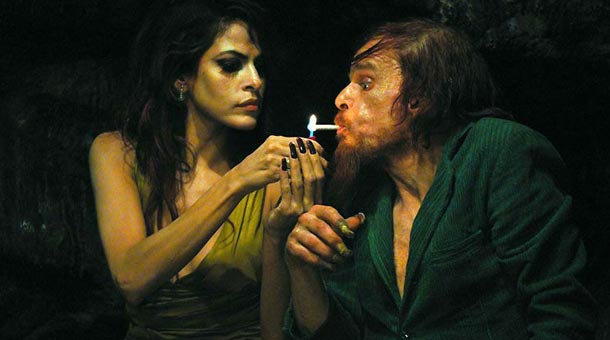
Trying to sell itself as an ode to the complexity and multi-dimensions of the art of film, it proves most to be an ode to the man on screen.

Trying to sell itself as an ode to the complexity and multi-dimensions of the art of film, it proves most to be an ode to the man on screen.
Holy Motors opens in a theater of unmoving bodies, an unseen film plays. A man wakes in a bed on a boat, uses the key he has in place of a finger and stumbles through the wall into the movie theater as a baby and a dog walk up the aisles. Having established strange as the new normal, it’s a bit easier to accept the rest of this film and it’s so-called “story line”.
The film follows a day in the life of Monsieur Oscar (Denis Lavant), who makes his way around Paris from one “appointment” to the next in a white stretch limo driven by Céline (played gracefully by Edith Scob), his dutiful chauffeur. At each stop, Oscar exits from his limo as someone new. He’s an elderly beggar woman, a motion capture stunt man with sensors illuminating his body, a monstrous kidnapper, a hard-nosed father, a dying old man, a thug sent to assassinate his own doppelganger, and the list continues as Monsieur Oscar’s day is long. We watch Oscar between each appointment reading the file on what he is to be next, grabbing a bite to eat, chatting with Celine and transforming himself for whatever is next on the agenda. ‘Behind and in front of the camera’ become meaningless phrases as our actor prepares, meticulously applying fake hair and rubber masks, and puts himself into his scene, changing his entire persona on a dime. He is woman, he is young, he is old, he is two of himself, he is hideous, and he is handsome.
While Leos Carax’s first feature film in over a decade may be trying to sell itself as an ode to the complexity and multi-dimensions of the art of film, it proves most to be an ode to the man on screen. The actor, who carries out each emotion and holds the story in his hands. Denis Lavant, Carax’s longtime favorite actor and star of most his films, proves that his expert chameleonic abilities are the real subject of this film.

Carax imagines a world where the cameras are always rolling and the actor does not choose his parts, he must be ready to be anything. However, he seems to forget that a film works best when those parts are given context, when we the audience are able to see the evolution of those characters, and our day with Oscar gives us no real insight into his life. The only scene where we may be seeing a moment that is truly just Oscar’s story is when he literally runs into an ex-love, played by Kylie Minogue. She implies they may have had a child once upon a time and sings a haunting song wondering aloud what if they had done things differently. While the scene was a great reminder of the emotional impact music has inside film, it’s over all too quickly and we’re left to wonder what was the rest of these two old lovers’ story? Or was this another scene and we’ve been duped into thinking it may have been real? Lavant is credited to have played 11 roles in Holy Motors, though Celine says he has only 9 appointments that day. What’s real and what isn’t? And so Carax checks off the musical genre among his references in the film and we move on. Though, on the note of music, the intermission of the film, a sweeping harmonized accordion number almost makes the whole film worth the cost of admission. Almost.
Carax’s film has laugh out loud moments, beautiful tableaus, and a truly versatile actor but it falls short of a being a thoroughly realized film and thus isn’t believable as a sincere celebration of the art form. At least Carax does acknowledge that most essential cog of the movie experience motor: the audience. Oscar’s mysterious boss tells him in one scene, “Beauty is in the eye of the beholder”, and Oscar asks, “What if there is no beholder?” reminding us that without the audience the actor works in vain, his existence holds no meaning. Filmmaking has evolved consistently throughout the years, and one day the cameras may indeed be invisible, but the actor and his audience will always be essential. If Carax had been a bit more mindful of the audience’s needs, he may have made a true masterpiece and not a disjointed glimpse at a great actor.